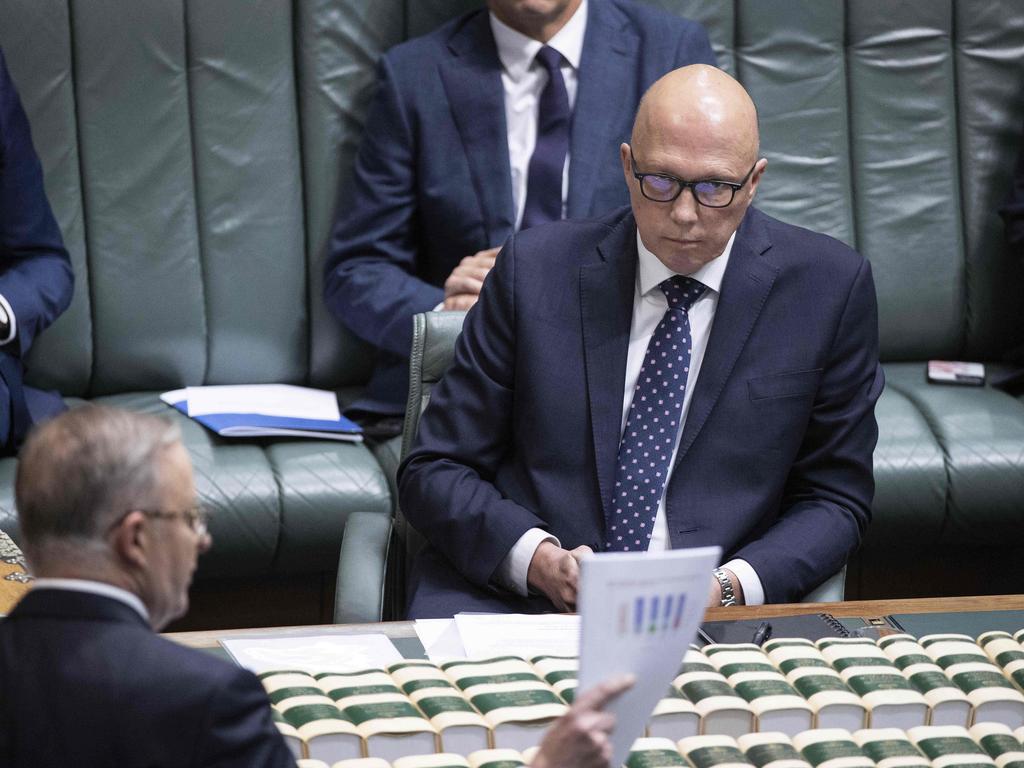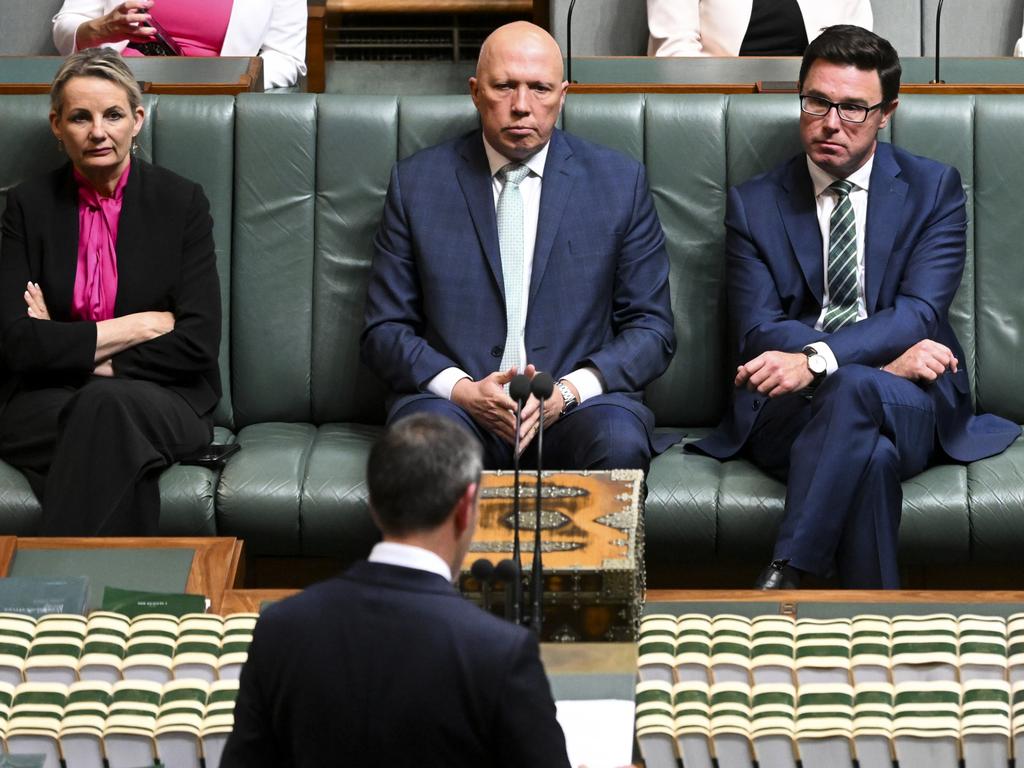
The Opposition Leader begins from a forlorn position. While Anthony Albanese had a narrow election win, the Liberals suffered a devastating defeat, the party facing attrition on two fronts – from Labor in suburban seats and from the teals, the new independent movement, in blue-ribbon seats. The grassroots dilemmas run deep in Western Australia, South Australia and Victoria. Likely to lose office in NSW next year, the Liberals would be in opposition in every mainland state.
As a realist Dutton knows the challenge. Like the Prime Minister, Dutton is a veteran, elected to parliament in 2001 and a survivor through eight election campaigns in the Brisbane seat of Dickson, a marginal or semi-marginal seat, for those who think Dutton is out of synch with the public.
He is a product of the Howard party, picked by John Howard from the ruck and given a ministry after just one term. Ever since Dutton has enjoyed friendships across the factional spectrum. Over time Dutton grew as the Liberal hard man and de facto leader of the conservative wing – yet he was always a pragmatist, whether helping Malcolm Turnbull get up the postal plebiscite to resolve the same-sex marriage debate or combining with Mathias Cormann to sustain Turnbull’s leadership before his decisive break from Turnbull.
Dutton has got a lot to live down from numerous hard-line declarations over the years. History says he has no chance at the next election. Opposition leaders taking over after election defeats don’t become prime minister; witness Andrew Peacock after the Coalition’s 1983 defeat, Kim Beazley after Labor’s 1996 defeat, Brendan Nelson after the Coalition’s 2007 defeat and Bill Shorten after Labor’s 2013 election defeat.
From the day he took the job Dutton knew his prime task was to stem the decline, to hold the Liberals together. Halting the rot would constitute success in its own right and, so far, Dutton has achieved that. Beyond averting further troubles, Dutton has some advantages.
He has no rival. Dutton can lead without fear of challenge. With Josh Frydenberg out of parliament the party expects Dutton to lead into the next election, unlike Nelson after 2007. Dutton seeks to unite the party, reflected in his frontbench. Expectations are low. If Dutton gets competitive with Albanese in the country, that will be success. Recall how Peacock in 1984, against all odds, made ground against Bob Hawke.
Dutton is strategically clear-headed, a function of his longevity. He rejects as folly the argument that the Liberals should surrender the seats lost to the teals this year. There is no way the party, if it accepted such losses as permanent, could recover these seats elsewhere to win. Dutton knows. He won’t buy the populist conservative push along those lines.
Dutton believes Labor is vulnerable in both suburban and teal seats, the upshot of rising inflation, increased cost of living, higher interest rates, negative real wages until 2024 and, above all, because of escalating power prices. This is his script. In his budget reply Dutton enunciated the Liberal Party view of history, saying: “There’s a historical pattern of Labor creating a mess and the Coalition cleaning it up.”
Many dispute this view yet it has traction in our culture. Dutton will push this narrative for the entire term. He doesn’t have to manufacture the coming crisis; the numbers are in the budget. Dutton intends to resurrect the deepest psychological fears about Labor – that its instincts on the big economic issues are wrong.
Dutton’s message, embedded in his budget reply, is that Labor’s character cannot address any of the frontline issues obsessing the public. It is unsure of what to do and, whatever it does, will likely involve a breach of promises along with still leaving households worse off, a dangerous double negative.
Australians changed government in 2022 because they felt it was safe to do so. The public had low expectations of Albo but trusted him enough. Dutton’s message is that Labor made election pledges it cannot meet, that it is destined to become a “breach of trust” government and that Labor has the wrong instincts for the challenges it faces.
Dutton believes the energy crisis has a long way to run and that Labor is locked into an ideological prism – it doubles down on renewables while it is hostile to coal, sceptical about gas and weak on action to secure new gas supply. In his budget reply he said the technology doesn’t yet exist to sufficiently store renewable energy and that Labor is making a strategic blunder – “Labor is going to phase out coal and gas before the new technology has been developed and rolled out”, the consequence being higher energy prices for years due to flawed government policy.
He says investment in renewables is essential but Labor’s goal of 82 per cent renewables by 2030 “comes without a plan to ensure reliable baseload power”. Seeking to reduce climate as an election-losing issue for the Liberals, Dutton will present as pro-renewables but insist Labor has got the energy mix wrong with households and industry guaranteed to pay a heavy price.
Dutton is anxious to both defend the Liberal record in office but signal what makes him different from Scott Morrison. He said by 2019 the Coalition had brought the budget back to balance, its Covid management “didn’t get everything right but got most things right’’ and Labor “could not name a single country whose position they would rather be in”.
Dutton will run on values more than Morrison. He has put education standards and curriculum on the table. He won’t wear woke politics and believes too many people have been intimidated. He wants a conversation about nuclear power. Dutton will prove superior to Morrison in holding the Liberal base. At the same time he seeks to shift his image, perhaps from hard man to strong man, though Dutton wouldn’t say that.
Aware that many people will never like him, Dutton bids for respect. Having seen Albo’s success in telling his personal story, Dutton has begun that process – the oldest of five kids, parents with a work ethic, young Peter working in a local butcher’s shop, saving to buy his first house at age 19. Dutton presents as authentic, saying the politicians he can’t stand are the phonies.
He knows tone is vital these days. Dutton’s speech as leader is down-to-earth, he never sounds like a radical. He presents as an equitable leader, listing the Albanese policies he will support. Dutton is not a Tony Abbott demolitionist. He says the Liberals are the party of tax cuts, they support older Australians working more, they want access to super for first-home buyers and they are the party of national security.
Any Liberal recovery, if it happens, will be risky and take time. But Dutton has his opening script for a long journey.








Peter Dutton has found his script. Leading a party facing an existential crisis after the 2022 election Dutton presents himself in the Howard Liberal Party tradition, sells a backstory about his own life and has fashioned critiques of Albanese Labor with the potential to strike home.